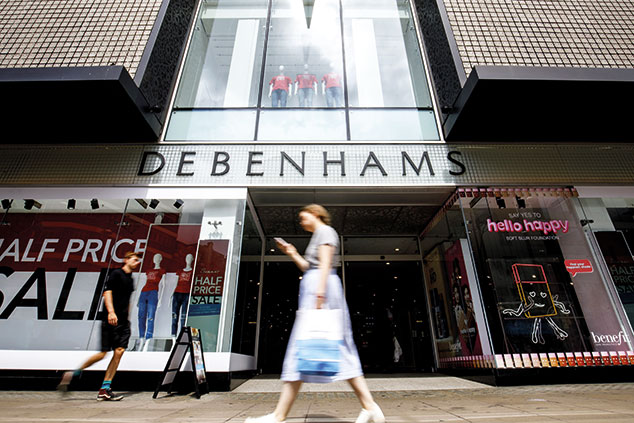
Debenhams is rarely in the news for positive reasons. Last week, the department store named the 22 of its 50 stores that it will be closing next year, a move that will affect 1,200 staff. This is yet another sign that department stores may not be long for this world. But it’s also a reminder to look at whether this could affect your property investments.
Investment bank UBS has examined 50 UK shopping centres owned by four real-estate investment trusts (Reits) – British Land, Landsec, Hammerson and Intu – and found that 20% of the total shopping-centre floorspace owned by these funds was let to retailers classed as in “CVA/admin”. This refers to stores with a company voluntary arrangement or in administration, or “shrinking”: those within the top-100 retailers by floorspace seeing declining sales.
Long-term risks
Although a company voluntary arrangement (CVA) sounds fairly pleasant, it’s actually a way for an insolvent company to pay creditors over a fixed period while still trading.
It may involve repaying debt at a reduced level, or over a longer period than initially agreed. Importantly, a CVA can impose rent reductions on landlords, or in some instances allow retailers to back out of leases altogether. Landlords therefore don’t want many of their tenants to be in this situation.
In UBS’s view, the Reits’ exposure to struggling shops poses long-term risks, including lower rental-growth prospects and higher vacancies. Hammerson and Intu have the highest exposure to CVA/admin or shrinking retailers, at 24% of floorspace each, with British Land and Landsec at 20% and 13% respectively. By category, 66% of Hammerson and 54% of Intu’s shopping-centre space is occupied by fashion and department stores, “likely the most heavily disrupted by e-commerce”.
It is worth noting that the four Reits have themselves declared much lower levels of exposure to CVAs, albeit via a different, more traditional, measure, reporting between 1.7% and 4.1% of rental income affected by CVAs. Intu suggests that replacing department stores, which traditionally pay low rents, with new tenants may actually bode well for future rental growth. It’s also important to look at the exposure to struggling stores within the context of the funds’ property portfolios as a whole. For example, 49% of British Land’s portfolio is invested in offices. However, it’s clear that British retail’s struggles are far from over. So if you are invested in commercial property, keep an eye on your exposure, and make sure your fund is sufficiently diversified.